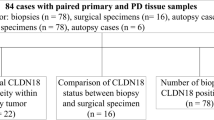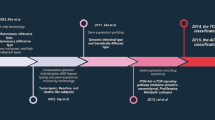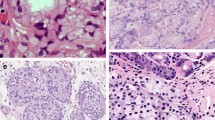Abstract
Purpose
MG7-Ag is a human gastric-carcinoma-associated antigen. The expression of MG7-Ag was found to increase gradually with the development and progression of gastric cancer. Moreover, a poorer prognosis was found in MG7-Ag positive gastric-carcinoma patients than in MG7-Ag negative patients. However, neither MG7-Ag expression nor its clinical significance has been previously examined in squamous cell carcinoma (SCC) of the esophagus. In this study, we examined the expression of MG7-Ag in esophageal squamous cell carcinomas to assess its value as a prognostic indicator.
Methods
The expression of MG7-Ag was detected in 112 cases of esophageal squamous cell carcinoma (SCC) by immunohistochemical analysis. The relation of MG7-Ag staining with various clinicopathological features was statistically analyzed.
Results
The staining of MG7-Ag was detected in SCC, while not in normal epithelial cells. In esophageal SCC, MG7-Ag was found significantly correlated with depth of invasion (P = .012), in T4, T3 carcinomas but not in T2, T1 carcinomas, lymph node metastases (P = .029), pathological stage (P = .005). Consistently, the survival rate tended to be statistically lower in patients with MG7-Ag positive SCCs than in MG7-Ag negative SCCs (P = .005). However, no significant difference was observed between MG7-expression and patient age, sex, tumor location, differentiation, distant metastasis, and lymphatic invasion.
Conclusion
MG7-Ag might play a positive role in the process of carcinogenesis and progression of esophageal SCC, and it could be considered as one valuable prognostic indicator in esophageal SCC.




Similar content being viewed by others
Reference
Zhao Y, Wang R, Fan D. The molecular mechanisms of esophageal cancer. EXCLI J 2006; 5:79–92
Ando N, Ozawa S, Kitagawa Y, Shinozawa Y, Kitajima M. Improvement in the results of surgical treatment of advanced squamous esophageal carcinoma during 15 consecutive years. Ann Surg 2000; 232:225–32
Adham M, Baulieux J, Mornex F, de La Roche de Bransat E, Ducerf C, Souquet JC, Gerard JP. Combined chemotherapy and radiotherapy followed by surgery in the treatment of patients with squamous cell carcinoma of the esophagus. Cancer 2000; 89:946–54
Eloubeidi MA, Desmond R, Arguedas MR, Reed CE, Wilcox CM. Prognostic factors for the survival of patients with esophageal carcinoma in the U.S.: the importance of tumor length and lymph node status. Cancer 2002; 95(7):1434–43
Kuwano H, Nakajima M, Miyazaki T, Kato H. Distinctive clinicopathological characteristics in esophageal squamous cell carcinoma. Ann Thorac Cardiovasc Surg 2003; 9(1):6–13
Igaki H, Kato H, Tachimori Y, Nakanishi Y. Prognostic evaluation of patients with clinical T1 and T2 squamous cell carcinomas of the thoracic esophagus after 3-field lymph node dissection. Surgery 2003; 133(4):368–74
Ogata Y, Fujita H, Yamana H, Sueyoshi S, Shirouzu K. Expression of vascular endothelial growth factor as a prognostic factor in node-positive squamous cell carcinoma in the thoracic esophagus: long-term follow-up study. World J Surg 2003; 27(5):584–9
Brucher BL, Becker K, Lordick F, Fink U, Sarbia M, Stein H, Busch R, Zimmermann F, Molls M, Hofler H, Siewert JR. The clinical impact of histopathologic response assessment by residual tumor cell quantification in esophageal squamous cell carcinomas. Cancer 2006; 106(10):2119–27
Fan DM, Zhang XY, Chen XT, Mu ZX, Hu JL, Qiao TD, Chen BJ, Wang JY, Zhang ZQ, Gao ZQ. Establishment of four monoclonal antibodies to a poorly differentiated gastric cancer cell line MKN-46-9 and immunohistochemical study on their corresponding antigens. Chin J Med PLA 1988; 13:12–5
Ren J, Fan DM, Zhou SJ. Establishment of immuno-PCR technique for the detection of tumor associated antigen MG7-Ag on the gastric cancer cell line. Zhonghua Zhongliu Zazhi 1994; 16:247–50
Ren J, Chen Z, Juan SJ. Detection of circulating gastric carcinoma-associated antigen MG7-Ag in human sera using an established single determinant immuno-polymerase chain reaction technique. Cancer 2000; 88:280–5
Liu J, Zhang XY, Fan DM. The value of MG7 antigen in predicting cancerous change in displastic gastric mucosa. Int J Clin Pract 2002; 56:169–72
Zhang X, Hong L, Chan WY, Qiao T, Chen B, Liu Y, Fan D. Expression of MG7-Ag in patients with gastric cancer correlates with weaker T cell immune response and more proinflammatory cytokine secretion. Biochem Cell Biol 2006; 84(2):135–41
Sobin LH, Wittekin C. 1997 UICC TNM Classification of Malignant Tumors, 5th ed. New York: Wiley, 1997
Xu L, Jin BQ, Fan DM. Selection and identification of mimic epitopes for gastric cancer-associated antigen MG7 Ag. Mol Cancer Ther 2003; 2(3):301–6
Lin T, Liang S, Meng F, Han Q, Guo C, Sun L, Chen Y, Liu Z, Yu Z, Xie H, Ding J, Fan D. Enhanced immunogenicity and antitumour effects with heterologous prime-boost regime using vaccines based on MG7-Ag mimotope of gastric cancer. Clin Exp Immunol 2006; 144(2):319–25
Qiao TD, Zhang XY, Hu JL, Fan DM, Chen BJ, Chen XT, Zhou SJ, Mu ZX. Expression of the tumor-associated antigen (MG7-Ag) in 1000 cases of atypical dysplasia of the gastric mucosa. Jiefangjun Yixue Zazhi 1993; 18:121–3
Lee CH, Lum JH, Cheung BP, Wong MS, Butt YK, Tam MF, Chan WY, Chow C, Hui PK, Kwok FS, Lo SC, Fan DM. Identification of the heterogeneous nuclear ribonucleoprotein A2/B1 as the antigen for the gastrointestinal cancer specific monoclonal antibody MG7. Proteomics 2005; 5(4):1160–6
Guo DL, Dong M, Wang L, Sun LP, Yuan Y. Expression of gastric cancer-associated MG7 antigen in gastric cancer, precancerous lesions and H. pylori -associated gastric diseases. World J Gastroenterol 2002; 8(6):1009–13
Liu J, Hu JL, Zhang XY, Qiao TD, Chen XT, Wu KC, Ding J, Fan DM. The value of MG7 antigen in predicting cancerous change in dysplastic gastric mucosa. Int J Clin Pract 2002; 56(3):169–72
Yu ZC, Ding J, Pan BR, Fan DM, Zhang XY. Expression and bioactivity identification of soluble MG7 scFv. World J Gastroenterol 2002; 8(1):99–102
Fengtian H, Yongzhan N, Baojun C, Taidong Q, Zheyi H, Daiming F. Production of phage-displayed anti-idiotypic antibody single chain variable fragments to MG7 monoclonal antibody directed against gastric carcinoma. Chin Med Sci J 2002; 17(4):215–9
Ikeda M, Natsugoe S, Ueno S, Baba M, Aikou T. Significant host- and tumor-related factors for predicting prognosis in patients with esophageal carcinoma. Ann Surg 2003; 238(2):197–202
Noguchi T, Kimura Y, Takeno S, Chujo M, Uchida Y, Mueller W, Gabbert HE. Chromosomal imbalance in esophageal squamous cell carcinoma: 3q gain correlates with tumor progression but not prognostic significance. Oncol Rep 2003; 10(5):1393–400
Tabernero J, Macarulla T, Ramos FJ, Baselga J. Novel targeted therapies in the treatment of gastric and esophageal cancer. Ann Oncol 2005; 16(11):1740–8
Schrump DS, Nguyen DM. Novel molecular targeted therapy for esophageal cancer. J Surg Oncol 2005; 92(3):257–61
Mathew R, Arora S, Khanna R, Mathur M, Shukla NK, Ralhan R. Alterations in p53 and pRb pathways and their prognostic significance in oesophageal cancer. Eur J Cancer 2002; 38(6):832–41
Feng B, Jiang YG, Wang RW, Fan SZ. p73 protein expression and its clinical significance in esophageal cancer tissues. The Practical Journal of Cancer 2002; 17(1):7–10
Xiao-Ping H, Tie-Hua R, Peng L, Qiu-Liang W, Guang-Yu Y, Jing-Hui H, Xiao-Dong S, Xiao-Dong L, Bao-Jiang L, Peng-Yuan Z, Kai L, Zhi-Fan H. Cyclin D1 overexpression in esophageal cancer from southern China and its clinical significance. Cancer Lett 2006; 231(1):94–101
Kato H, Yoshikawa M, Miyazaki T, Nakajima M, Fukai Y, Masuda N, Fukuchi M, Manda R, Tsukada K, Kuwano H. Expression of vascular endothelial growth factor (VEGF) and its receptors (Flt-1 and Flk-1) in esophageal squamous cell carcinoma. Anticancer Res 2002; 22(6C):3977–84
Acknowledgment
We thank Mr. Zenpeng Li (Department of Pathology, Institute of Surgery Research, Daping Hospital, The Third Military Medical University, Chongqing, China) for his excellent technical assistance and Mr. Yunming Li (Department of Health Statistics, The Fourth Military Medical University, Xi’an, P.R. China) for his statistical analysis assistance.
Author information
Authors and Affiliations
Corresponding author
Rights and permissions
About this article
Cite this article
Zhao, Y., Jiang, Y., Wang, R. et al. Expression and Prognostic Value of MG7-Ag in Patients With Surgically Resectable Esophageal Squamous Cell Carcinoma. Ann Surg Oncol 14, 2621–2627 (2007). https://doi.org/10.1245/s10434-007-9416-6
Received:
Accepted:
Published:
Issue Date:
DOI: https://doi.org/10.1245/s10434-007-9416-6




